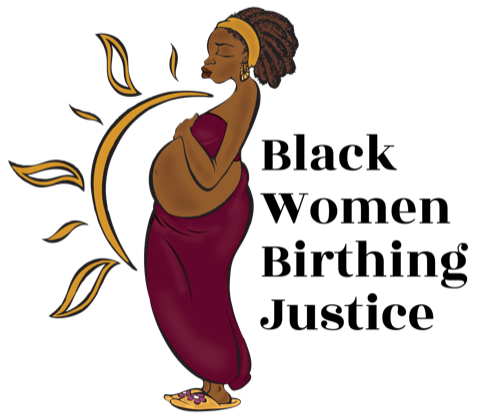Why We Need Queer Birth Justice
June marks "Pride Month," an annual celebration that aims to make LGBTQIA people visible. For queer people of color like me, Pride is fraught with the irony of invisibility. Historically, queer and transgender people of color (QTPOC), have had our role in the creation of pride erased. As a black queer woman, I take this time to reflect on where members of my community need to receive support, and where QTPOC-centered activism can help existing movements to access a deeper radical potential. The dilemma of QTPOC parenting gets to the root of these issues. In these times, the choice to parent as a queer person of color is a radical act; he journey through conception, pregnancy, and birth for QTPOC entails struggles with racism, queer-phobia and gender policing in the medical industry. I believe that the loving interventions of midwifery and doula care can provide solutions to the challenges pregnant and birthing QTPOC face.
Black pregnant women enter a maternal health care system shaped by histories of medical racism and misogyny that date back to slavery; this legacy often translates into traumatic birth experience for mamas and babies today. Transgender and gender non-conforming (GNC) people in particular face a history of medical gate-keeping, and a trend of doctors denying trans and GNC people health care that persists today. Even though queer people have obtained greater visibility and acceptance, trans and GNC queers remain far more vulnerable to medical trauma than their cisgender lesbian and gay peers.
At the root of health care injustice for queer and trans folks is the medical model’s historical perception of same-gender attraction and transgender identity as illnesses. In medicine, this is reflected in the definition of gender dysphoria, which diagnoses the distress that queer people, especially trans and GNC people, can feel when their gender does not align with their sex or gender assigned at birth. Gender dysphoria was previously called "gender identity disorder." The diagnosis suggested that gender variance was an illness that needed to be medically treated. The medical understanding of transgender identity leads to the presumption that transitioning is a process meant to completely match a person’s physical body to their gender identity– including disabling trans people’s reproductive systems. The dual misunderstandings of trans and GNC identity: that the identity itself is a disease, and that post-transition individuals cannot become pregnant, create a massive barrier to comprehensive care for pregnant and parenting QT folks. For QTPOC parents, an intersectional birth justice framework can provide liberation from a medical model that describes the situation of queer pregnancy as impossible, queer bodies as ill, and black pregnancies as undesirable.
The need for an alternative to the medical model makes the doula and midwifery models of care ideal for QT parents. For black queer, trans and GNC parents black midwifery offers an alternative to hyper-medicalized care that rejects excessive intervention and is attuned to our racial traditions. But, in order for QTPOC to access the transformative potential of midwifery and doula care for their birth experiences, the birth justice movement must develop a significant competency in queer genders and medical experiences. Birth workers cannot provide maternal care to queer parents, or serve as effective advocates for QTPOC navigating the medical system for fertility services and ob-gyn care without building competency in QTPOC identity and health-care needs. Black women, and other women of color in reproductive justice are emphatic about the need for “culturally competent” care for mothers of color.Without taking the steps to learn the histories of queer medical injustice, and it’s connections to economic and social disenfranchisement for QTPOC, birth workers will be unable to create the same quality of radical care for black queer parents as they currently offer for black cis-women, including low-income and incarcerated women.
A crucial step in reclaiming black queer, trans, and GNC selves from medicalized misrecognition and violence is allowing QTPOC to speak as authorities of their own experience, and creators of their own resources. Doula training projects like the the QTPOC Birthwork Training held in Seattle, and the multidimensional community work of black queer people like Micah Hobbes Frazier and Alexis Pauline Gumbs (who has an intergenerational doula practice with her mother Pauline Ann McKenzie-Day) offer care that is by and for queer and trans people of color outside the medical industrial complex. Birth justice organizations that currently serve black cisgender straight women need to support QTPOC midwifery and doula practices by providing resources (financial or otherwise) and visibility to projects like these.
The birth justice community’s radical potential lies in its ability to provide compassionate birth alternatives, and advocacy for people who must navigate treacherous medical environments, within a social justice framework. Helping black women and black queer people to claim agency over their reproductive selves when it has historically denied them is a crucial practice in a larger, intersectional movement for QTPOC liberation and anti-violence work. QTPOC enter amedical system haunted by the specters of gender, sexuality, race, and class, which together impact our ability to self-determine our reproductive futures, and the futures of our families. When black midwifery and doula care becomes accessible to queer and trans parents, we will achieve a much sharper vision for birth justice.
For further reading:
From the National Gay and Lesbian Task Force and the National Center for Transgender Equality, “Injustice at Every Turn: A Report from the National Transgender Discrimination Survey.”
From the National Black Justice Coalition, “Injustice at Every Turn: A Look at Black Respondents in the National Transgender Discrimination Survey.”
From the National Center for Transgender Equality, “Transgender Sexual and
